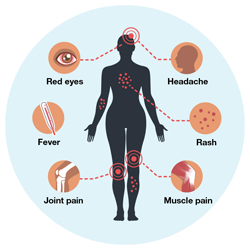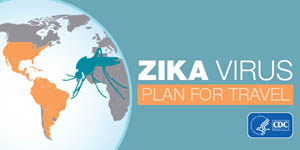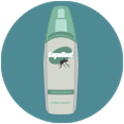→ Infectious Disease → Zika Virus
Zika Virus
TRAVEL ALERT: If you are pregnant or are trying to become pregnant, do not travel to an area with a current outbreak of Zika.
Talk to your doctor if you are pregnant or are trying to become pregnant and plan to travel to an area with past or current spread of Zika, but without a current outbreak.
For a complete list of places with travel notices, visit the Zika Travel Information page.
Zika virus is spread by certain types of mosquitoes and through sexual contact. Infection during pregnancy can cause severe birth defects. Learn how you can protect yourself.On this page:
- Transmission of Zika
- Risk of Zika
- Symptoms of Zika
- Zika & Pregnancy
- Travel Information
- How to Prevent Zika
- Resources for Maine Residents
- Mosquito-borne Diseases in Maine
General Information
Zika is spread mostly through the bite of an infected Aedes species mosquito (Ae. aegypti and Ae. albopictus). These mosquitoes bite during the day and night. Dengue and chikungunya viruses are also carried by these types of mosquitoes and are not currently found in Maine. However, these mosquitoes are present in a large area of the United States and Aedes albopictus have the potential to reach the southern part of Maine.
Zika can also be spread through unprotected sexual contact from a person who has Zika to their partner and can be passed from a pregnant woman to her fetus. Infection during pregnancy can cause certain birth defects such as microcephaly.
Zika virus is found globally in Central and South America, Africa, Southeast Asia, and the Pacific Islands. There is currently no vaccine or medicine for Zika.
Transmission of Zika
Zika can be passed:
- Through the bite of an infected mosquito
- Through unprotected sex
- From a pregnant woman to her fetus
- Through blood transfusion (very likely but not confirmed)
Risk of Zika
Anyone who lives in or travels to an area with the risk of Zika and has not previously been infected with Zika virus can get it from a mosquito bite. Once a person becomes infected with Zika, it is very likely they will be protected from future infections.

Symptoms of Zika
Many people that are infected by Zika do not show any symptoms or only have mild symptoms. The most common symptoms of Zika are:
- Fever
- Rash
- Headache
- Joint pain
- Conjunctivitis (Red eyes)
- Muscle pain
Symptoms typically last several days to a week. People usually do not get sick enough to go to the hospital, and they very rarely die of Zika. See your doctor if you develop symptoms and you recently traveled to an area with risk of Zika or had unprotected sex with someone that lives in or traveled to an area with risk of Zika.
Zika & Pregnancy
Zika infection during pregnancy can cause microcephaly, a birth defect of the brain. Infection during pregnancy is also linked to miscarriage, stillbirth, and other serious birth defects. There are increased reports of Guillain-Barre Syndrome, an uncommon sickness of the nervous system, in certain areas affected by Zika.
Pregnant women should not travel to an area with a current outbreak of Zika. If you must travel to one of these areas, talk to your doctor first and strictly follow steps to prevent mosquito bites and practice safe sex. Pregnant women and women planning to become pregnant should talk to their doctor before traveling to an area with past or current spread of Zika, but without a current outbreak.
Learn more about Zika virus and pregnancy.
Check out the Maine Tracking Network. This site provides data on 12 of the 22 specific birth defects that the Maine Birth Defects Program follows.
Travel Information

Federal CDC has issued guidance for travel, prevention, testing, and preconception counseling related to risks for pregnant women and couples considering conception in areas of active Zika virus transmission in the continental United States and Hawaii.
Please visit the Zika travel information webpage before you travel for the most up-to-date information.
How to Prevent Zika
There is no vaccine to prevent Zika. The best way to prevent Zika is to protect yourself and your family from being bitten by mosquitoes.
Clothing

- Wear long-sleeved shirts and pants
- Treat your clothing with permethrin or buy pre-treated items
Insect Repellent

- Use Environmental Protection Agency (EPA)-registered insect repellents with one of the following active ingredients: DEET, Picaridin, IR3535, Oil of Lemon Eucalyptus (synthetic version of PMD)
- When used as directed, these insect repellents are proven safe for pregnant and breastfeeding women
- Do not use insect repellents on babies younger than 2 months old.
- Do not use products containing oil of lemon eucalyptus on children younger than 3 years old.
At Home and Travel Stays

- Stay in places with air conditioning, windows, and door screens to keep mosquitoes outside.
- Sleep under a mosquito bed net if air conditioned or a screened room is not available, or if you are sleeping outdoors.
- Mosquito netting can also be used to cover babies younger than 2 months old in carriers, strollers, or cribs.
Sexual Transmission

- Prevent sexual transmission of Zika by using condoms or not having sex.
Learn more about Zika prevention
Resources for Maine Residents
- Zika virus fact sheet (PDF)
- Video: Protect Yourself Against Mosquito-borne Diseases
- Video: Reducing Mosquito Habitat Around Your Home